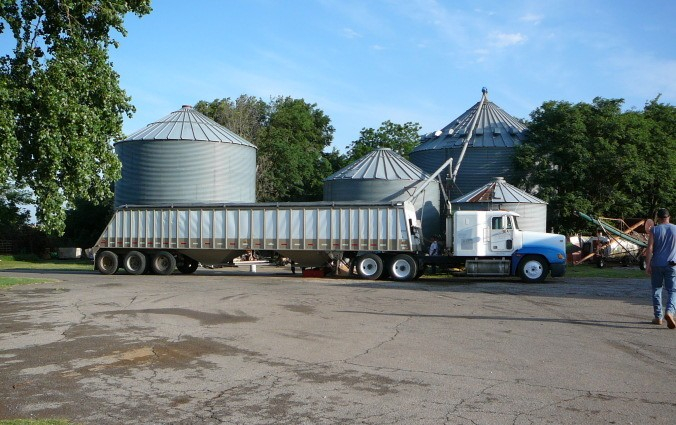Support strong Canadian climate journalism for 2025
A bill exempting fossil fuels used for certain farming activities from the federal carbon price is headed to the Senate after the Conservatives, Bloc Québécois, NDP and Greens joined forces to pass it on March 29.
If it becomes law, Bill C-234 will add natural gas and propane used to dry grain and heat livestock barns to the list of exempted farm fuels, which already includes diesel and gasoline.
“It’s disappointing to see the NDP, the Green Party and the Bloc — parties who claim to be progressive — vote alongside the Conservative Party to effectively weaken climate action in Canada,” Environment and Climate Change Minister Steven Guilbeault said in an emailed statement to Canada’s National Observer.
“Our government will always stand up for putting a price on pollution, which has long been recognized by people on both the right and the left as the best market-based approach to cutting greenhouse gases and driving cleaner technologies.”
Guilbeault went on to reference the high cost of climate-related disasters like floods, storms and wildfires, which often hit farmers hard.
Three Liberal MPs voted in favour of the bill, which was sponsored by Ontario Conservative MP Ben Lobb: P.E.I. MPs Heath MacDonald and Robert Morrissey, and Kody Blois, MP for Kings-Hants, N.S.
Because the carbon price is a “highly charged issue that matters in an agrarian riding” like Blois’, it made sense for him to vote against his party, said Alex Marland, professor and head of the department of political science at Memorial University. As Marland pointed out, Kings-Hants has some Progressive Conservative voting history. The federal Conservatives have made the carbon price a key issue, with leader Pierre Poilievre and his caucus harping on it at every opportunity.
In a news release, Warren Steinley, the Conservative’s associate shadow minister for agriculture, declared the bill’s passage a “big win” that will “put tens of thousands of dollars back in the pockets of Canadian farm families.”
Many environmental groups, including Environmental Defence, warn the bill will erode the power of carbon-pricing signals used to drive innovation for low-carbon solutions.
While farmers “do not yet have a full suite of options available to replace fossil-fuelled grain dryers and barn space heating,” tax rebate programs have, and can, be used to support farmers without weakening the carbon price, Tim Gray, executive director at Environmental Defence, said in a news release.
“Exempting these high-emission activities from carbon pricing for farmers will only further encourage other sectors to demand similar treatment,” he said, pointing to ongoing problems with this in other sectors, in particular, the oil and gas industry.
The environmental organization is urging the Senate to make amendments requiring the federal government to change the tax and regulatory regime to accelerate the development and adoption of clean energy technologies that can be used in farm operations.
Last year, the Standing Committee on Agriculture and Agri-Food amended the bill to include a sunset clause that will end the natural gas and propane exemption eight years after the bill comes into force. It also includes the option for Parliament to extend the exemption if viable technologies are not available.
This means the industry will get “a little break right now, but it's not going to last forever,” NDP agriculture critic Alistair MacGregor said in January. In response to concerns about the erosion of the carbon price signal, MacGregor has said the carbon price isn’t incentivizing farmers to switch technologies because there’s a lack of commercially viable alternatives to propane-run grain dryers.
The same day Bill C-234 was passed, Agriculture and Agri-Food Canada announced up to $22.2 million for 45 new projects related to farmers adopting more efficient grain-drying technology across the country.
Geerts Farms Ltd. is receiving up to $2 million to purchase and install a new grain dryer and biomass boiler powered by locally sourced wood waste, thus completely eliminating the need for propane to dry its crops, according to the release.
To date, the adoption stream of the department’s Agricultural Clean Technology Program has supported 99 grain dryer projects across the country, according to the federal agriculture department.
Over the last two years, the federal government has invested more than $1.5 billion in programs to help farmers reduce emissions, including the aforementioned nearly half-billion-dollar Agricultural Clean Technology Program, which helps farmers purchase more energy-efficient grain dryers and heating systems, said Guilbeault.
Liberal NDP Ryan Turnbull told Canada’s National Observer the eight-year exemption does not encourage farmers to change or invest in new technology because it takes away the power of the carbon price signal.
Disincentivizing investment in developing alternative technologies is only one of several problems with the bill, Turnbull told Canada’s National Observer in late January.
“One other big problem with this bill is that it actually double compensates, because we've already offered farmers a rebate in the last federal budget,” said Turnbull. “So it creates problems and confusion, because now we're going to have a rebate and an exemption … it doesn't work. You can't have both.”
Natasha Bulowski / Local Journalism Initiative / Canada’s National Observer






Comments
I find it interesting that every sector needs to be treated the same. The oil and gas sector has been involved in a 50+ year disinformation campaign to stop action against Climate Change. The reason we're in this mess is directly related to this disinformation. Why on earth do they deserve the same treatment as other sectors? Farming didn't do this. I constantly amazed that the media are always ready to give the oil and gas sector a free pass.
I now understand the "viewpoint" piece I read the other day in the local Thunder Bay newspaper about how important methane gas is for farmers. A lobby group getting free press. Disgusting.
Very troubling that Elizabeth May would vote for this. We're back in 2013 with the Green's supporting the Energy East pipeline so as to seem electable.
Time to hit the streets,